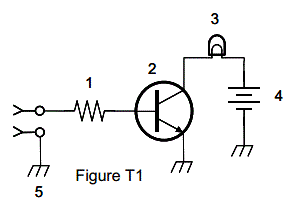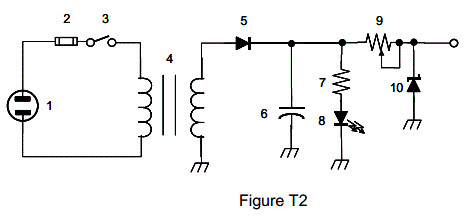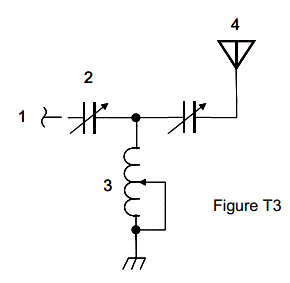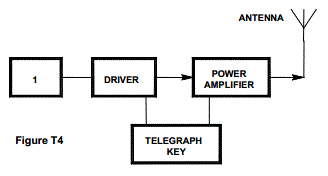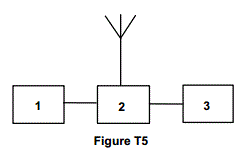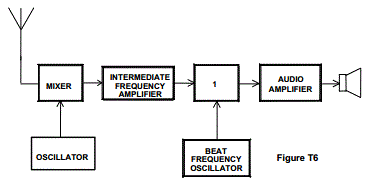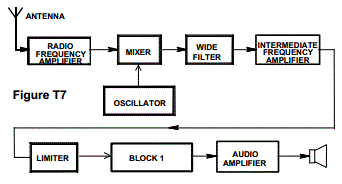Ham Technician License Practice Quiz
• Percentage: 0%; Correct: 0; Total: 0 of 35
T0A10: What can happen if a lead-acid storage battery is charged or discharged too quickly?
The battery could overheat and give off flammable gas or explode
The voltage can become reversed
The 'memory effect' will reduce the capacity of the battery
All of these choices are correct
T0B07: Which of the following is an important safety rule to remember when using a crank-up tower?
This type of tower must never be painted
This type of tower must never be grounded
This type of tower must never be climbed unless it is in the fully retracted position
All of these choices are correct
T0C01: What type of radiation are VHF and UHF radio signals?
Gamma radiation
Ionizing radiation
Alpha radiation
Non-ionizing radiation
T1A10: What is the FCC Part 97 definition of an amateur station?
A station in an Amateur Radio Service consisting of the apparatus necessary for carrying on radio communications
A building where Amateur Radio receivers, transmitters, and RF power amplifiers are installed
Any radio station operated by a non-professional
Any radio station for hobby use
T1B01: What is the ITU?
An agency of the United States Department of Telecommunications Management
A United Nations agency for information and communication technology issues
An independent frequency coordination agency
A department of the FCC
T1C01: Which type of call sign has a single letter in both the prefix and suffix?
Vanity
Sequential
Special event
In-memoriam
T1D09: Under which of the following circumstances are amateur stations authorized to transmit signals related to broadcasting, program production, or news gathering, assuming no other means is available?
Only where such communications directly relate to the immediate safety of human life or protection of property
Only when broadcasting communications to or from the space shuttle.
Only where noncommercial programming is gathered and supplied exclusively to the National Public Radio network
Only when using amateur repeaters linked to the Internet
T1E01: When must an amateur station have a control operator?
Only when the station is transmitting
Only when the station is being locally controlled
Only when the station is being remotely controlled
Only when the station is being automatically controlled
T1F10: Who is accountable should a repeater inadvertently retransmit communications that violate the FCC rules?
The control operator of the originating station
The control operator of the repeater
The owner of the repeater
Both the originating station and the repeater owner
T2A06: What must an amateur operator do when making on-air transmissions to test equipment or antennas?
Properly identify the transmitting station
Make test transmissions only after 10:00 p.m. local time
Notify the FCC of the test transmission
State the purpose of the test during the test procedure
T2B02: What is the term used to describe the use of a sub-audible tone transmitted with normal voice audio to open the squelch of a receiver?
Carrier squelch
Tone burst
DTMF
CTCSS
T2C09: When may an amateur station use any means of radio communications at its disposal for essential communications in connection with immediate safety of human life and protection of property?
Only when FEMA authorizes it by declaring an emergency
When normal communications systems are not available
Only when RACES authorizes it by declaring an emergency
Only when authorized by the local MARS program director
T3A05: When using a directional antenna, how might your station be able to access a distant repeater if buildings or obstructions are blocking the direct line of sight path?
Change from vertical to horizontal polarization
Try to find a path that reflects signals to the repeater
Try the long path
Increase the antenna SWR
T3B06: What is the formula for converting frequency to wavelength in meters?
Wavelength in meters equals frequency in hertz multiplied by 300
Wavelength in meters equals frequency in hertz divided by 300
Wavelength in meters equals frequency in megahertz divided by 300
Wavelength in meters equals 300 divided by frequency in megahertz
T3C08: What causes "tropospheric ducting"?
Discharges of lightning during electrical storms
Sunspots and solar flares
Updrafts from hurricanes and tornadoes
Temperature inversions in the atmosphere
T4A09: Which would you use to reduce RF current flowing on the shield of an audio cable?
Band-pass filter
Low-pass filter
Preamplifier
Ferrite choke
T4B03: What is the purpose of the squelch control on a transceiver?
To set the highest level of volume desired
To set the transmitter power level
To adjust the automatic gain control
To mute receiver output noise when no signal is being received
T5A03: What is the name for the flow of electrons in an electric circuit?
Voltage
Resistance
Capacitance
Current
T5B04: How many volts are equal to one microvolt?
One one-millionth of a volt
One million volts
One thousand kilovolts
One one-thousandth of a volt
T5C06: What is the abbreviation that refers to radio frequency signals of all types?
AF
HF
RF
VHF
T5D05: What is the resistance in a circuit for which the applied voltage is 12 volts and the current flow is 1.5 amperes?
18 ohms
0.125 ohms
8 ohms
13.5 ohms
T6A05: What type of electrical component consists of two or more conductive surfaces separated by an insulator?
Resistor
Potentiometer
Oscillator
Capacitor
T6B06: How is a semiconductor diode's cathode lead usually identified?
With the word "cathode"
With a stripe
With the letter "C"
All of these choices are correct
T6C02: What is component 1 in figure T1?
Resistor
Transistor
Battery
Connector
T6D04: Which of the following can be used to display signal strength on a numeric scale?
Potentiometer
Transistor
Meter
Relay
T7A12: Which term describes the ability of a receiver to discriminate between multiple signals?
Tuning rate
Sensitivity
Selectivity
Noise floor
T7B01: What can you do if you are told your FM handheld or mobile transceiver is over deviating?
Talk louder into the microphone
Let the transceiver cool off
Change to a higher power level
Talk farther away from the microphone
T7C06: What does an SWR reading of 4:1 mean?
An antenna loss of 4 dB
A good impedance match
An antenna gain of 4
An impedance mismatch
T7D04: Which instrument is used to measure electric current?
An ohmmeter
A wavemeter
A voltmeter
An ammeter
T8A05: Which of the following types of emission has the narrowest bandwidth?
FM voice
SSB voice
CW
Slow-scan TV
T8B09: What causes "spin fading" when referring to satellite signals?
Circular polarized noise interference radiated from the sun
Rotation of the satellite and its antennas
Doppler shift of the received signal
Interfering signals within the satellite uplink band
T8C04: Which of the following is good procedure when contacting another station in a radio contest?
Be sure to sign only the last two letters of your call if there is a pileup calling the station
Work the station twice to be sure that you are in his log
Send only the minimum information needed for proper identification and the contest exchange
All of these choices are correct
T8D04: What type of transmission is indicated by the term NTSC?
A Normal Transmission mode in Static Circuit
A special mode for earth satellite uplink
An analog fast scan color TV signal
A frame compression scheme for TV signals
T9A03: Which of the following describes a simple dipole mounted so the conductor is parallel to the Earth's surface?
A ground wave antenna
A horizontally polarized antenna
A rhombic antenna
A vertically polarized antenna
T9B03: Why is coaxial cable used more often than any other feedline for amateur radio antenna systems?
It is easy to use and requires few special installation considerations
It has less loss than any other type of feedline
It can handle more power than any other type of feedline
It is less expensive than any other types of feedline
